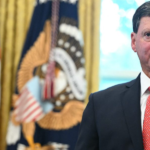Federal Reserve governor Chris Waller said Friday he had a “great interview” to potentially succeed Jerome Powell as chair of the central bank, while warning the U.S. labor market is so weak it may actually be contracting.
Waller, a key voice on the Fed’s policy-setting committee, made clear his current outlook is dominated by concerns about a faltering labor market. He said it’s “not doing great,” that it’s “weak,” and appeared to surprise Liesman by saying he wouldn’t be surprised if job growth had turned negative.
With official government statistics now delayed as a result of the government shutdown, Waller said he and other members of the Fed have been relying more heavily on private-sector data and anecdotal reports from businesses to gauge employment dynamics. The picture, he argued, is troubling.
The data isn’t as representative or broad as the official government data, but they’re “all telling you the same story” about the weak labor market, he said.
“Job growth has probably been negative the last few months,” he noted, prompting Liesman to respond, “Wow.” Waller argued the Fed is not fulfilling the maximum employment half of its dual mandate: “If you have negative job growth, that’s not maximum employment, where you’re shrinking your hiring.”
Anecdotally Waller said he’s not hearing of anybody having big hiring plans. “All I hear is ‘We’re not backfilling, we’re not firing, we’re holding off any job things.’” He waved off concerns about inflation or labor shortages, saying, “The labor market is not tight in any way, shape, or form.”
By Waller’s reading, the situation falls well short of the Fed’s dual mandate of maximum employment and price stability.
Waller has been consistent in his calls for more rate cuts, which he repeated in his interview with Liesman, positioning him as a dove in favor of running the economy hot, as President Donald Trump has often called for.
On inflation, Waller pushed back against fears tariffs could trigger the kind of wage-price spiral seen in the 1970s.
“Any tariff effects are one-off effects … This doesn’t cause persistent inflation,” he said, noting central banks have long understood such dynamics.
Without a tight labor market, Waller argued, there can be no second-round inflationary effects as workers demand higher pay to match rising prices.
“We’re not seeing any evidence of that whatsoever, so forget about any second-round effects from the tariffs,” he said.
He did, however, note tariffs are having a clear but uneven impact on consumer prices. In conversations with CEOs, Waller said they’re saying high-income shoppers are “price-insensitive” and tend to absorb tariff-related price hikes, while lower-income consumers prompt businesses to hold prices steady to avoid losing customers. “It’s about a 40% pass-through,” Waller estimated, pointing to what he called a “two-tier” effect in the market. There isn’t inflation in consumer prices for the lower half of the income distribution, because those customers will just “walk out the door,” he added.









